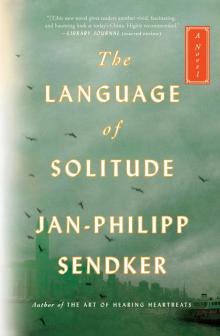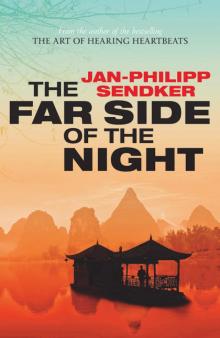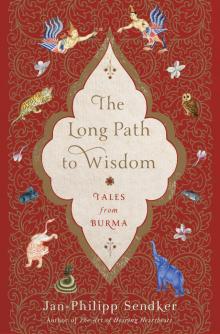- Home
- Jan-Philipp Sendker
The Far Side of the Night Page 5
The Far Side of the Night Read online
Page 5
_________
The ring of the telephone woke Christine. A gray dawn light was filtering into the room through a crack in the curtains. She looked at her watch. It was just before half-five. Paul was sitting at the desk and he picked up the phone. He nodded mechanically, ended the conversation, and stood up.
“Where are you going?” she asked quietly.
“To the foyer. Someone wants to see me.”
“Wait, I’ll come with you.” She tried to get up, but the sedative effect of the pills was still too strong. She sank back into the pillows.
“I’ll be right back,” Paul said.
“Wait, wait . . .”
She heard the sound of the door clicking shut.
X
No one was waiting in the foyer for him. The night porter gestured towards the exit with a nervous incline of the head.
Half a dozen luxury sedan cars were parked in the driveway. Paul looked around but no one was to be seen. Suddenly, one of the car windows a couple of meters away from him was lowered by the width of a hand and someone called to him and told him to get in. At the wheel was a pockmarked man with a big black mole on his forehead. Paul recognized him immediately.
“Quick. Close the door,” he commanded.
Paul got into the car. He saw a small woman on the back seat.
The man gripped the steering wheel with both hands, looking straight ahead.
“What do you want from me?”
“You must leave Shi today,” he said, without looking at Paul.
“Why? My son has disappeared. I’m not leaving Shi before . . . ”
“He is lying next to my wife, asleep.”
Paul whipped around. On the back seat was a heap covered in a blanket. The woman pushed one corner of the fabric to one side and David’s face appeared. Paul looked from the woman to the man. Tears shot into his eyes.
“Who are you?”
“That doesn’t matter,” the man said brusquely.
“What do you want? Ransom money? I will give you everything I have. I have shares and a house in Hong Kong that I could sell . . .”
“We don’t want any money.”
“What, then?”
“Nothing.”
“Nothing?” Paul was sure he had misunderstood.
“But why . . . I don’t understand . . .”
“The less you know, the better for us and for you.”
Paul looked at the man and the woman more closely. They seemed to be in their mid-forties and were simply dressed. Both wore necklaces with a gold cross as a pendant.
“Take your child and leave the city as quickly as you can,” the man said again.
“But why?”
“Because people will be looking for you.”
“Who?”
They said nothing. Paul repeated his question.
“My husband’s boss,” the woman said quietly. “He kidnapped your child. We’re simply bringing him back to you. In the name of the Lord.”
Paul did not immediately grasp what she was referring to. “Which lord?”
“Jesus Christ, our savior.”
“My boss gave your son to his girlfriend as a present. Because she found him so adorable.”
“Who is your boss?”
They ignored his question.
“How did the girlfriend see David?” Paul asked, beginning to feel suspicious.
“She saw him yesterday at the panda zoo, and expressed a desire to have him,” the woman said. “My husband recently started work as one of his boss’s drivers, and I was supposed to be your son’s nanny. If the boss realizes that we and the child are no longer there, it won’t be long before he realizes that your son has been reunited with his parents. He will do everything to get hold of him again.”
Paul shook his head disbelievingly. “She expressed a desire to have him? A child as a present?”
They nodded.
“I don’t believe it. He can’t simply take my . . .”
“He can, he can . . .” the woman retorted.
“You’re not from here,” her husband added. “You have no idea how powerful this family is.”
Paul looked from one to the other doubtfully. “But how could he take David . . .”
The man interrupted him. “The police will arrest you on some pretext and find drugs in your room. You will be handed a sentence in court for drug smuggling. That’s what happened recently to a businessman from Singapore who got into a disagreement with our boss. He’s now in jail for the next nine years.”
Paul said nothing for a moment. The scenario the driver was describing was not unlikely.
“What will you do now?” he asked, breaking the silence.
“We have family in Fujian province. They’ll hide us for a while.”
“Can I help you?”
“How could you help us? The Lord will protect us.”
Paul thought about how much money he had with him. “I’d like to give you something . . .”
“We don’t want your money,” the man and the woman said in unison.
“Why are you doing this?”
The man looked at his wife, as though she alone had the answer.
“We believe in the Lord. My husband has worked six months for his boss. He has accumulated enough sins. Your child . . . that was too much.”
“Thank you. I . . .” Paul was lost for words.
“Truly I tell you, whatever you did for one of the least of these brothers and sisters of mine, you did for me. Matthew 25:40,” she said quietly. “The Lord shows us the way.”
Paul saw fear in both pairs of eyes, but he did not hear it in their quiet voices.
“You now have two, three hours at most before someone notices we’re missing. You must have left the city by then. The hotel will be one of the first places they search. Perhaps the hotel will even report this to him. The head of security is in his pay.”
Paul turned to open the door, then hesitated.
“Who is your boss?”
“Chen Tian Hao, the son of Party Secretary Chen.” The man paused. “Now go.”
Paul got out of the car, opened the rear passenger door and carefully took his sleeping son in his arms. “How can I thank you?”
“There is no reason to thank us.”
The woman nodded at him. “May the Lord be with you. He will bring you to safety. God bless you.”
_________
Paul hurried through the empty foyer, watched by the night porter’s suspicious eyes. David woke briefly in the lift. He opened his eyes, and when he saw Paul, a smile flitted over his face. Then he fell asleep again.
Christine was sleeping. He put David down next to her and hurriedly packed their things. He wanted to get out of the hotel as quickly as possible. He looked up flights online: the 16:30 flight was full but he got three seats on the later flight.
When he had arranged the flights, he realized that he had no idea where they were to spend their time until then. In another hotel? Too dangerous. Every foreign guest had to be registered with the police. Shopping? In a café? A restaurant? Public places were also too risky, if the couple was to be believed, and Chen was looking for him. The safest place was Zhang’s monastery.
Paul sat down on the bed and stroked Christine’s face gently. He bent down and whispered in her ear, “Darling, wake up. We have to go.”
XI
Zhang had been sitting with the other monks in the hall for two hours now, trying to let go. Trying not to think about his painful knees, not to think about his back, not to think about Paul, David, and Christine.
The more he tried, the more difficult it became. He focused on his breath. Felt the cool morning air rush into his nose and escape, warmed by his body. He chanted his mantra. He kept his eyes on the golden Buddha in front of him. Nothing helped. His thoughts would not stop whirling around his friend. What kind of karma was that? To lose two children? What misdeeds had he done in his previous life to deserve this? Or were the rules of life differe
nt from what the Enlightened One had divined and proclaimed? Was it coincidence after all that governed life? A cold and merciless arbitrary force? The power of the absurd?
Just as Paul always claimed.
The hammering of the first construction workers could be heard from the hall. Zhang was pleased about the noise this morning. It was the unofficial sign that the meditation session had come to an end. The abbot and the first few monks rose.
Zhang went into the refectory and was morosely eating noodles when he heard familiar voices. He turned around: Paul, Christine, and David were standing in front of him. Zhang immediately saw from the look in his friend’s eyes that it was not just good news that had brought them to the monastery so early in the morning.
He fetched bowls of rice and vegetables and a thermos flask of tea for them and they sat in the courtyard in the first rays of the sun. Paul described what had happened while David ate a little.
He finished by saying, “I’ve booked the 22:00 flight to Hong Kong for us this evening.”
Zhang shook his head vigorously. “You can’t go to the airport.”
“Why not?” Christine asked uncertainly.
“What can happen to us there? I have the tickets and the boarding passes. We’re already checked in,” Paul added.
Zhang marveled at their naivety. “You have to show your passports before you board. If Chen is looking for you, and I assume he is, they will stop you then.”
“For what reason?”
“They want your child. And they are used to getting what they want. If they don’t get what they want from people voluntarily, they take it.”
“Who are ‘they’?” Paul had still not understood. Zhang could tell by the doubt in his voice.
“Chen. Xi. Wu. Choose a name. The most powerful people in the country. It would be easy to concoct a reason to get both of you locked away for interrogation for months. The resulting trial would not be fair, and the judges would not be impartial. You know all that! This is not your first time in China! Do you think that anyone will take any interest if you disappear for years into a prison in Sichuan? The American embassy would visit you a couple of times at the beginning. Maybe the American government would make a formal complaint. And then? You think a diplomatic crisis would ensue over you? I don’t think so.”
_________
Zhang watched them to see what effect his words had. “And all through that, David would be in a children’s home. Or with the Chens – that would be easy to arrange too.”
“What else can we do? Is there a train to Shenzhen?” Christine asked.
Both of them had not grasped the seriousness of the situation they were in. “Forget the train. You need ID to buy the tickets. Apart from that, I wouldn’t travel to the south. I don’t think they would let you travel onward to Hong Kong. Chen used to be Party Secretary of Guangdong province. He is well connected there. The border would be closed to you.”
“Do you really think his power extends that far?”
“I don’t know. But that is one of the problems in this country. We don’t know exactly how far a person’s power reaches. Do you want to come up against it?”
“No, of course not,” Paul said. “But where should we go instead? To Yunnan and over the mountains to Burma?”
“No. That would mean hiking in the mountains for days. Not with a four-year-old.”
“Where to, then?”
“To Beijing,” Zhang said decisively.
Paul looked at him disbelievingly. “Why to the capital?”
“Because the American embassy is there. That’s the safest place. You’re American. You’re not dissidents. The embassy can arrange for you to leave the country. Chen’s power ends at their doors.”
“How far is Beijing from Shi?” Christine asked, filled with doubt.
“About two thousand kilometers.”
“How do we get there?”
Zhang passed both hands over his shaven head. He had not the slightest idea how they could travel to Beijing without being identified. Paul was conspicuous because of his height alone and David’s appearance made him no less so. They could not stay overnight in hotels or use any form of public transport.
All it would take was a few phone calls in Chen’s name and the police in every province would be on the hunt for them. Who would dare to take them into hiding for even one night? Who would be prepared to endanger themselves taking them from one place to another? And why? The only motive that Zhang could think of was money.
He lit a cigarette, took a couple of drags from it and put it out again. “How much cash do you have on you?”
Christine and Paul thought about this. Not more than six thousand yuan, they reckoned.
“That’s not much.” Six thousand yuan was not enough to buy them free passage to the capital. Not even sixty thousand would be sufficient. The risk was too great, too incalculable. Chen hunted down his opponents without mercy, and he did not spare their families, friends, and business partners. He was a child of the Cultural Revolution, and proved every day in Shi that he had learned its lessons well. Anyone who was lenient to his enemies would regret it. Anyone who displayed weakness would lose. Zhang looked at them one by one. David had hardly eaten anything and not said a word. Paul looked totally exhausted.
“You look tired. Do you want to rest a little in my room? I’ll try to organize something. I still have a couple of relatives in the city.”
XII
Zhang wandered the streets aimlessly. He did not want to stay in the monastery. He needed to move in order to get his thoughts in order. But he found it difficult. A child as a present. Like a pet. Even though it sounded absurd, Zhang had not the slightest doubt that it was true. People stopped at nothing nowadays to get what they wanted, and their appetites were insatiable. All sense of propriety had been lost.
Just like before. He had experienced the loss of restraint and the lack of conscience during the Cultural Revolution. No one could understand the excesses of China today without being familiar with the history of those years. They had been at war then. At war against the old world. At war against old ways of thinking. Traditional culture. Traditional customs. Traditional ways of doing things.
Now they were at war again. At war against the memories. At war against the environment. At war against modesty and moderation. Against decency and honesty. Nothing had really changed: once again they were at war with themselves. We are a traumatized people, he thought. Nothing had changed there either.
_________
Paul and his family had to leave the city as quickly as possible. The police would turn up in a few hours to interrogate Zhang. In the police station yesterday, he had been careless, telling one of the officers the name of the monastery he lived in.
But where could they go?
Zhang had to seek help from people who had turned their backs on society. They had to be living on the edges of it and have nothing more to lose, yet not be in public opposition to those in power, for political dissidents would be kept under surveillance. But how was he to find people like that in such a short time? And which of them would really be reliable? A betrayal would be well rewarded in such a case.
In China, no organizations escaped the control of the authorities. Apart from churches, nunneries, and monasteries, perhaps. Zhang thought about the couple that had brought David back to Paul.
In the name of the Lord.
Their religion had moved them to risk their lives. There was an underground church with thousands of fearless members, but he had no links to them. And he couldn’t get in touch with them so quickly.
Zhang remembered the abbot of a monastery not too far away whom he had encountered often in the last two years. The abbot came from a village a few hundred kilometers away in the northeast, near the border to Shaanxi province. At least that was on the way to Beijing. He probably had family there still or knew other Buddhists who would help. Zhang also thought about his own nephew, who lived in Shi and was the editor-inchie
f of a weekly publication that was, as far as it could be under current conditions, mildly critical of the regime. Perhaps he had an idea of how to help. These two men were Zhang’s only hope.
_________
When Zhang returned to the monastery three hours later, it was just after half-past eleven in the morning. He went straight to the abbot and told him that he had to make an urgent trip to Shenzhen due to a family emergency. His son had been severely injured in an accident and was in hospital. He had a ticket for the flight at eight p.m., but wanted to show his friends around the panda reservation before that. His friends would take the late flight back to Hong Kong, he said several times, very clearly.
It would be easy for the authorities to check on what he had said. With any luck, they would believe him and wait for Paul at the airport this evening. The red herring would buy them a few hours’ head start.
He hurried to his room. Paul, Christine, and David were asleep in his bed, more on top of than next to each other.
Zhang shook his friend’s shoulder vigorously. “Wake up.”
He dragged Paul out of a deep sleep. Paul looked around, blinking, and took a moment to remember where he was. He got up wearily.
“We have to get going immediately,” Zhang said urgently.
“Where to?”
“I’ll explain everything later.”
Christine woke slowly and with great difficulty.
“I’m thirsty,” David said.
“Have you anything to drink?” Paul asked.
“Later. You must hurry now.” Zhang heard the gong sounding for the meditation session at noon. “If we don’t get going immediately, it will be too late.”
They left the monastery via the back exit, where the car organized by Zhang was waiting. The last thing Zhang saw before they left was plainclothes policemen on their way to the abbot’s office.
XIII
Christine looked out of the window. The driver was taking a long time getting them out of Shi. There was a traffic jam on the three-tier highway that went on for kilometers past factories, warehouses, construction sites with half-finished buildings, and rubbish dumps. They left the highway and drove down a country road that twisted and turned. The sky clouded over and the low-hanging clouds cast the hilly landscape of rice paddies in a dull light.

 The Language of Solitude
The Language of Solitude A Well-Tempered Heart
A Well-Tempered Heart The Art of Hearing Heartbeats
The Art of Hearing Heartbeats The Far Side of the Night
The Far Side of the Night Whispering Shadows
Whispering Shadows Dragon Games
Dragon Games The Long Path to Wisdom
The Long Path to Wisdom